Democratization in the Philippines is a complex and ongoing process. Since gaining independence in 1946, the country has faced numerous hurdles in building a stable democratic system. While it has experienced periods of progress, such as the ousting of Ferdinand Marcos in 1986, the journey has been far from smooth.
Democratization requires significant effort from all parts of society. It involves addressing historical struggles, engaging the public, and overcoming resistance to change. The relationship between the government and its citizens plays a crucial role in shaping the future of democracy.
Today, the Philippines faces new issues, such as economic inequality and limited political participation. These challenges test the country’s ability to adapt and grow. Understanding these dynamics is essential for anyone interested in the future of democracy in the region.
Research and accurate information are vital in navigating these complexities. By examining both past and present, we can gain valuable insights into the path forward.
Key Takeaways
- Democratization in the Philippines is an ongoing and complex process.
- Historical events, like the Marcos dictatorship, have shaped the country’s political landscape.
- Public engagement and resistance to change are key factors in democratization.
- Economic inequality and limited participation are current issues affecting democracy.
- Research and accurate information are essential for understanding these challenges.
Overview of Democratization in the Philippines
From colonial rule to modern governance, the Philippines has navigated a complex democratic path. This journey reflects both historical resilience and ongoing struggles. Understanding this evolution requires examining key moments and their impact on today’s political landscape.

Historical Context and Evolution
The Philippines declared independence from Spain in 1898, but true sovereignty came in 1946 after U.S. rule. This period marked the beginning of democratic governance. However, the Marcos dictatorship in the 1970s disrupted progress, leading to widespread civil unrest.
The 1986 People Power Revolution was a turning point. It restored democracy and inspired similar movements worldwide. Since then, the country has faced a mix of progress and setbacks, shaping its current political situation.
Current Trends in Political Change
Today, the Philippines grapples with issues like economic inequality and limited political participation. The Duterte administration’s policies have sparked debates about authoritarianism and human rights. Despite these challenges, public engagement remains a vital part of the democratic process.
Recent research highlights the importance of addressing these issues to ensure a stable future. By learning from the past, the Philippines can continue its democratic journey with renewed effort and purpose.
Political Challenges and Governance Obstacles
Political obstacles remain a critical barrier to effective governance in the Philippines. These issues test the resilience of democratic systems and hinder progress. Understanding the root causes is essential for addressing these problems.
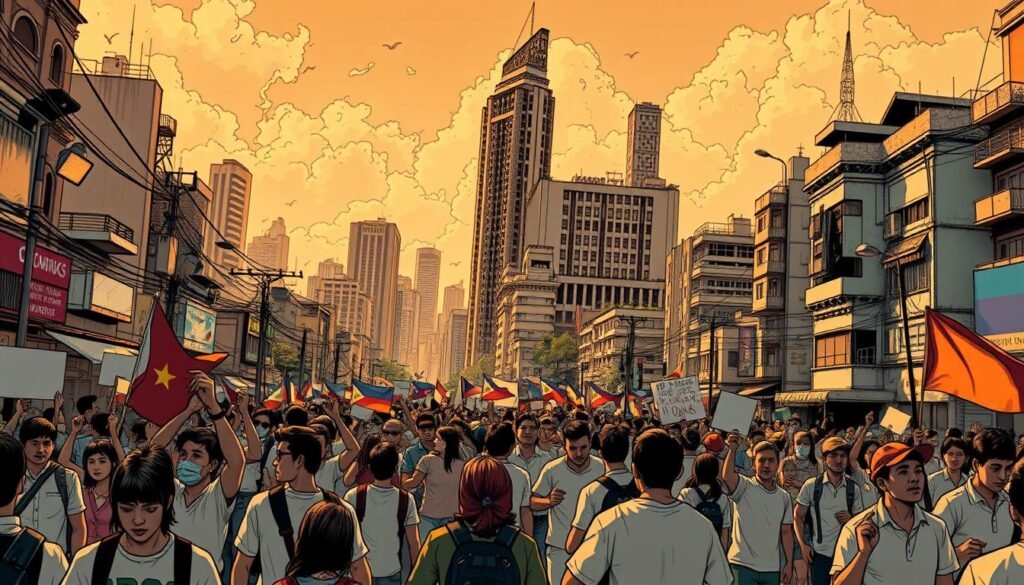
Institutional Framework and Policy Gaps
The institutional framework in the Philippines often fails to support meaningful reform. Policy gaps create inefficiencies and limit the government’s ability to address key issues. For example, outdated laws and weak enforcement mechanisms are common problems.
Research shows that these gaps are not unique to the Philippines. Many developing nations face similar issues. Addressing them requires a coordinated effort from all stakeholders.
Corruption and Bureaucratic Inefficiencies
Corruption remains a significant challenge in the Philippines. It undermines public trust and diverts resources away from critical projects. Bureaucratic inefficiencies further exacerbate the situation, slowing down decision-making processes.
For instance, procurement processes are often delayed due to red tape. This affects the timely delivery of public services. Tackling these issues is a complex task that requires systemic changes.
| Issue | Philippines | Comparative Example |
|---|---|---|
| Corruption | High | Moderate (India) |
| Policy Gaps | Significant | Moderate (Indonesia) |
| Bureaucratic Inefficiency | Severe | Moderate (Thailand) |
Addressing these governance obstacles is crucial for the Philippines’ democratic future. By learning from historical context and international examples, the country can pave the way for better political accountability.
Social and Cultural Dynamics in Democratization
The social and cultural fabric of the Philippines plays a pivotal role in shaping its democratic journey. Community trust and public engagement are essential components of this process. Without strong relationships between the government and its citizens, progress remains limited.
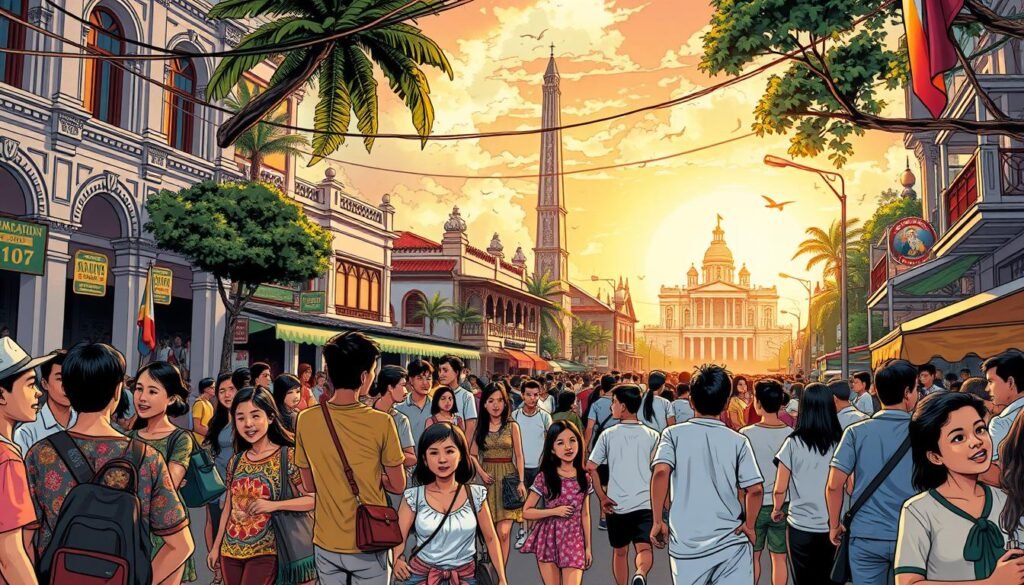
Cultural values and historical legacies deeply influence how society perceives political challenges. For example, the People Power Revolution of 1986 remains a powerful symbol of collective action. Such events highlight the importance of unity in overcoming governance issues.
Public engagement can serve as both a catalyst and an obstacle in democratic processes. While active participation strengthens democracy, cultural tensions and social dynamics can hinder progress. Addressing these complexities requires a nuanced approach.
Community Trust and Public Engagement
Building trust between the government and its citizens is crucial. Without it, public engagement efforts often fall short. For instance, community initiatives that lack transparency face significant resistance.
Research shows that trustworthy relationships are key to effective governance. When citizens feel heard, they are more likely to participate in political processes. This creates a positive feedback loop that strengthens democracy.
However, cultural tensions and social inequalities can disrupt this dynamic. For someone living in marginalized communities, political participation may seem inaccessible. Addressing these barriers is essential for inclusive democratization.
| Factor | Impact on Democratization |
|---|---|
| Community Trust | High trust levels increase public engagement and political participation. |
| Cultural Tensions | Cultural divides can hinder collaboration and slow democratic progress. |
| Social Inequalities | Marginalized groups often face barriers to participation, limiting inclusivity. |
By understanding these dynamics, the Philippines can work towards a more inclusive and resilient democratic system. The effort to bridge gaps between government and citizens is a vital step in this journey.
Economic Impacts and Funding Hurdles
Economic factors play a pivotal role in shaping the democratic landscape of the Philippines. Funding and resource allocation are critical components of this process. Without sustainable financial planning, democratization efforts face significant challenges.
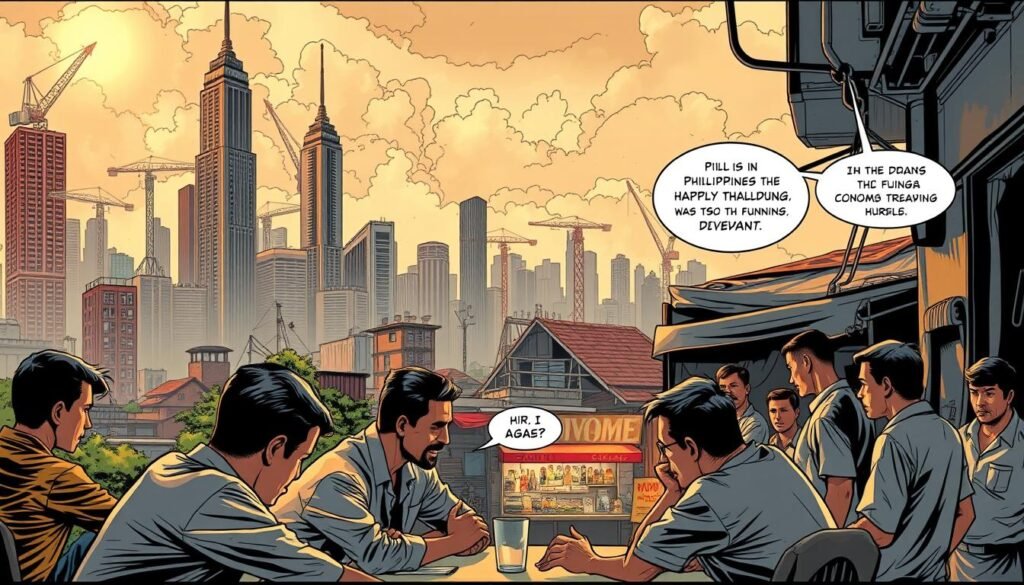
Budgetary constraints and an unstable investment climate often hinder progress. For someone living in a developing nation, these issues can feel insurmountable. Limited funding stalls important policy changes, creating a cycle of inefficiency.
Budgetary Constraints and Investment Climate
The Philippines struggles with limited public funds and a volatile investment climate. Research shows that economic strain correlates with inefficiencies in governance. For example, outdated infrastructure projects often face delays due to insufficient budgets.
Case studies highlight how economic policies can either exacerbate or alleviate these issues. For instance, increased foreign investment can boost growth, but it must be managed carefully. The way resources are allocated determines the success of democratic reforms.
Socioeconomic Inequalities and Resource Allocation
Socioeconomic inequalities further complicate the democratization process. Marginalized communities often lack access to resources and political participation. This creates a barrier for someone trying to engage in the democratic system.
Resource allocation is a key issue. Limited funding for education and healthcare affects the quality of life for many. Addressing these inequalities is essential for building a more inclusive society.
| Issue | Impact |
|---|---|
| Budgetary Constraints | Delays in infrastructure and policy implementation |
| Investment Climate | Volatility affects foreign and domestic investments |
| Socioeconomic Inequalities | Limits access to resources and political participation |
By addressing these economic hurdles, the Philippines can pave the way for a more stable democratic future. Sustainable financial planning and equitable resource allocation are vital steps in this journey.
Challenges: Balancing Progress and Resistance
Progress in democratization often meets resistance from entrenched systems. This dynamic creates a delicate balance between moving forward and preserving traditional power structures. Understanding this tension is crucial for anyone involved in transformative efforts.
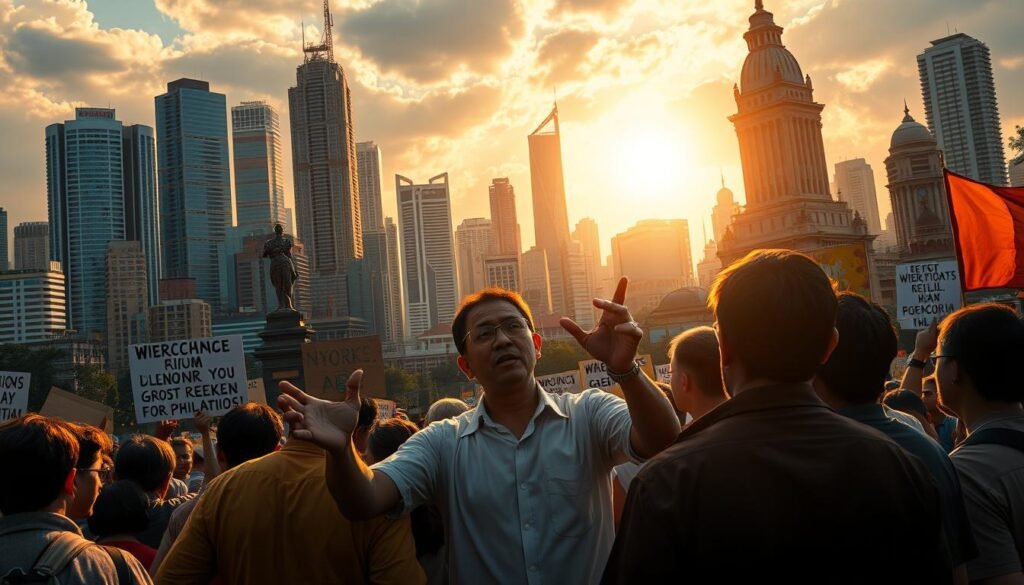
Internal Conflicts and Resistance to Change
Internal conflicts arise when democratization efforts clash with established norms. Political parties and certain population segments often resist change, fearing disruption to their influence. For someone advocating reform, this resistance can feel like an insurmountable barrier.
Research shows that resistance is a natural response to change. It often stems from fear of the unknown or loss of control. Addressing these concerns requires empathy and strategic planning. Leaders must navigate these dynamics carefully to avoid alienating key stakeholders.
Traditional power structures can persist even in the face of reform. This persistence highlights the complexity of democratization. Balancing progress with these entrenched systems is a significant challenge.
Leadership and Advocacy in Overcoming Resistance
Effective leadership plays a critical role in overcoming resistance. Advocates must communicate the benefits of change clearly and convincingly. For something as transformative as democratization, this communication is essential.
Inclusive practices can also mediate internal strife. Engaging all stakeholders in the process fosters trust and collaboration. This approach reduces resistance and builds a foundation for sustainable progress.
Case studies from other nations show that dialogue is key. Open conversations about fears and expectations can bridge divides. This strategy has proven effective in similar contexts, offering valuable lessons for the Philippines.
By addressing internal conflicts and fostering inclusivity, the Philippines can navigate its democratic journey more effectively. The effort to balance progress and resistance is a vital step toward a stable future. For more insights on overcoming resistance, explore this resource.
Integrating Global Perspectives and Local Realities
The Philippines’ democratic journey is deeply influenced by global standards and local realities. International frameworks, such as the Sustainable Development Goals (SDGs), provide a roadmap for addressing political and social issues. These global initiatives often inspire local efforts to strengthen governance and public engagement.
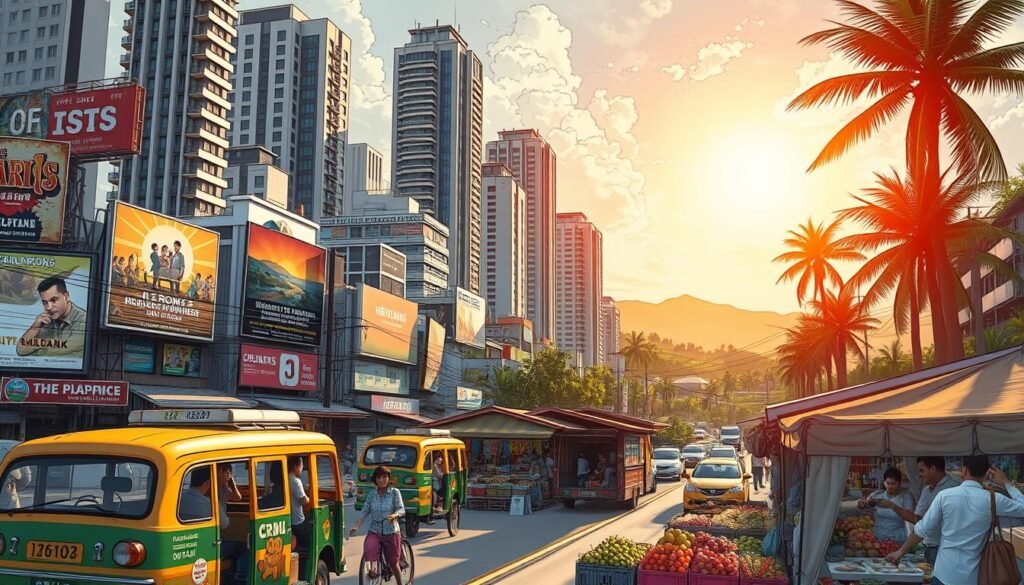
International policies play a significant role in shaping the Philippines’ political landscape. For someone involved in democratization, understanding these global influences is essential. The SDGs, for example, emphasize inclusivity and sustainability, which align with the country’s democratic goals.
Influence of International Policies and SDGs
Global challenges often mirror local realities. In the Philippines, issues like economic inequality and limited political participation are addressed through both local and international efforts. The SDGs provide a framework for tackling these problems, encouraging collaboration between governments and civil society.
Adapting global models to local contexts is a key strategy. For instance, international research on governance and public engagement is often tailored to fit the Philippines’ unique cultural and political dynamics. This approach ensures that solutions are both effective and relevant.
Cross-border collaborations also play a vital role. Partnerships with international organizations and other nations help address shared challenges. These collaborations foster knowledge exchange and innovation, driving progress in democratization.
By integrating global perspectives, the Philippines can inspire innovative local solutions. This approach not only addresses immediate issues but also builds a foundation for long-term democratic stability. For more insights on global and local integration, explore this resource.
The Role of Research, Information, and Mental Health
Understanding the role of research and mental health is vital for addressing societal challenges. Academic studies provide valuable insights into political and social issues, helping to define the parameters of ongoing problems. Reliable information and data analytics are essential tools for navigating these complexities.
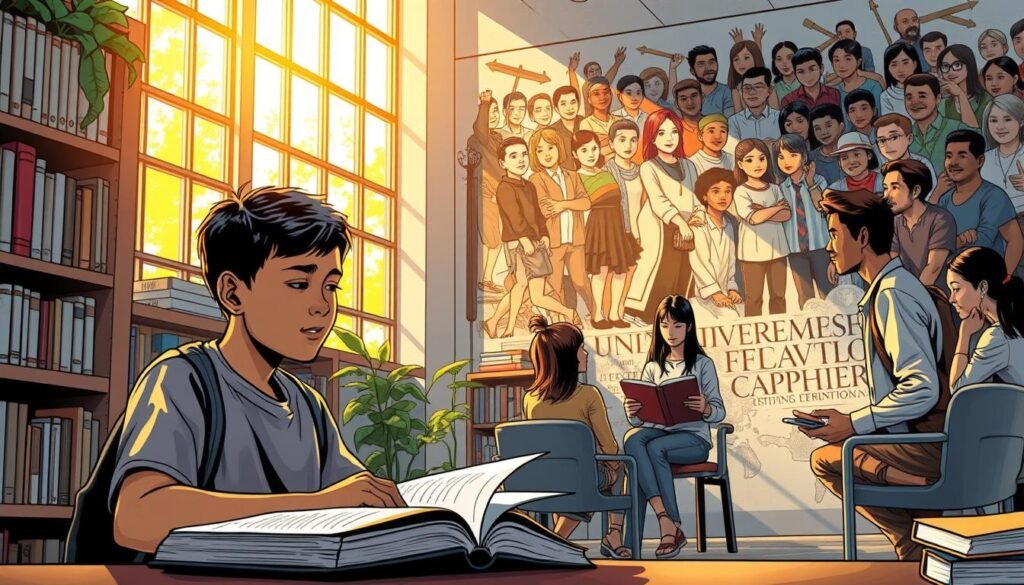
Peer-reviewed studies highlight the connection between mental health and political behavior. For someone involved in democratic reform, these findings are crucial. They reveal how societal well-being influences public sentiment and political participation.
Insights from Peer-Reviewed Studies
Research shows that mental health challenges can shape political engagement. For instance, individuals experiencing depression or anxiety may feel disconnected from the political process. This disconnection can lead to lower voter turnout and reduced civic participation.
Studies also emphasize the importance of early intervention. Addressing mental health issues in marginalized communities can foster greater inclusivity in democratic systems. This approach ensures that everyone has a voice in shaping their future.
Impact of Societal Well-Being on Political Change
Societal well-being is a key factor in political stability. When communities feel supported and heard, they are more likely to engage in democratic processes. Conversely, widespread mental health issues can create barriers to progress.
For example, economic inequality often exacerbates mental health challenges. This creates a cycle where marginalized groups struggle to participate in political change. Breaking this cycle requires targeted interventions and supportive policies.
| Key Finding | Impact on Democratization |
|---|---|
| Mental health influences political engagement | Better mental health leads to higher voter turnout and civic participation. |
| Early intervention fosters inclusivity | Addressing mental health issues ensures marginalized voices are heard. |
| Economic inequality exacerbates mental health challenges | Targeted policies are needed to break the cycle of disengagement. |
Supporting research initiatives is essential for democratic reform. By understanding the intersection of mental health and political behavior, the Philippines can create more inclusive and resilient systems. For more insights, explore this resource on the importance of mental health research.
Innovative Strategies and Policy Solutions
Innovative strategies are reshaping the way governments address democratic challenges. By testing new ideas and adapting proven methods, policymakers can create more effective solutions. These approaches often combine local insights with global best practices, ensuring relevance and scalability.

For someone involved in governance, understanding these strategies is essential. They provide a roadmap for overcoming obstacles and fostering progress. From digital tools to community-driven initiatives, innovation is transforming the political landscape.
Case Studies and Emerging Examples
One notable example is the use of digital platforms to enhance public participation. In the Philippines, something as simple as an online voting system has increased voter turnout in local elections. This approach addresses the challenge of limited political engagement by making the process more accessible.
Another emerging practice is the integration of global frameworks like the Sustainable Development Goals (SDGs). These goals provide a clear structure for addressing issues like economic inequality and environmental sustainability. By aligning local policies with international standards, governments can ensure comprehensive progress.
Research-backed methods are also gaining traction. For instance, peer-reviewed studies highlight the effectiveness of community-driven initiatives in building trust. When citizens feel heard, they are more likely to participate in democratic processes. This creates a positive feedback loop that strengthens governance.
By adopting these innovative strategies, the Philippines can address its democratic challenges more effectively. Testing new ideas and learning from successful examples is a vital step toward a more inclusive and resilient future. For more insights on tackling policy challenges, explore this resource.
Conclusion
The democratization journey in the Philippines reflects a blend of resilience and ongoing transformation. Historical, political, economic, and social factors have shaped this process, presenting both progress and persistent challenges. A balanced approach that integrates these dimensions is essential for sustainable growth.
Key findings from research and case studies highlight the importance of public engagement, equitable resource allocation, and innovative strategies. Addressing issues like economic inequality and limited participation requires continued dialogue and collaborative efforts. These steps can pave the way for a more inclusive and resilient democratic system.
Moving forward, the Philippines must embrace something transformative—whether through policy reforms, community-driven initiatives, or global partnerships. The journey is far from over, but with sustained effort and a commitment to learning from the past, the country can overcome its democratic challenges.
For further insights into collaborative governance, explore this resource. Together, we can strengthen democracy and build a brighter future for the Philippines.
FAQ
What is the historical context of democratization in the Philippines?
The Philippines has a rich history of political evolution, transitioning from colonial rule to independence. Key moments include the People Power Revolution in 1986, which marked a shift toward democratic governance. However, the journey has been marked by periods of authoritarianism and ongoing struggles for political stability.
What are the current trends in political change in the Philippines?
Recent trends include increased public participation in governance and efforts to strengthen institutions. However, issues like corruption and bureaucratic inefficiencies persist, creating obstacles to meaningful progress.
How does corruption affect governance in the Philippines?
Corruption undermines trust in public institutions and hampers effective policymaking. It leads to misallocation of resources, slows development, and creates barriers to achieving equitable growth.
What role does community trust play in democratization?
Community trust is vital for fostering public engagement and ensuring the success of democratic processes. When citizens trust their leaders and institutions, they are more likely to participate actively in governance and hold officials accountable.
How do socioeconomic inequalities impact democratization?
Socioeconomic disparities can hinder access to education, healthcare, and economic opportunities, creating divisions within society. Addressing these inequalities is crucial for building a more inclusive and sustainable democratic system.
What are the challenges of balancing progress and resistance in the Philippines?
Internal conflicts and resistance to change often slow down reforms. Balancing the need for progress with the realities of local dynamics requires careful negotiation and inclusive policymaking.
How do international policies influence democratization in the Philippines?
Global initiatives, such as the United Nations Sustainable Development Goals (SDGs), provide frameworks for addressing issues like poverty and inequality. However, aligning these goals with local realities remains a complex task.
What insights do peer-reviewed studies offer on democratization?
Research highlights the importance of mental health and societal well-being in fostering political stability. Studies also emphasize the need for evidence-based policies to address governance challenges effectively.
What innovative strategies are being used to address democratization challenges?
Case studies show that leveraging technology, promoting transparency, and encouraging public-private partnerships can drive positive change. These strategies help address systemic issues and create a more resilient democratic framework.
Source Links
- Democracy and other challenges in the Philippines – Gateway House
- Formal Democracy and its Alternatives in the Philippines: | Transnational Institute
- Democratic expressions amidst fragile institutions: Possibilities for reform in Duterte’s Philippines
- BTI 2024 Philippines Country Report
- Philippines | The Global State of Democracy
- Challenges Local Governments Face in 2023 and Beyond | GovPilot Government Software
- Political Governance of Wicked Problems
- 12 Big Problems That Government Urgently Needs to Address
- Civil Society and Democratization in Asia: Prospects and Challenges in the New Millennium
- Culture, institutions and democratization* – Public Choice
- TRADE AND DEVELOPMENT REPORT 2023 – Chapter I: Current Trends and Challenges in the Global Economy: Stalling or Falling?
- Socio-Economic Impacts and Challenges of the Coronavirus Pandemic (COVID-19): An Updated Review
- Breaking Through Resistance: How Leaders Turn Challenges into Innovation
- Progress and challenges of multidrug resistance proteins in diseases
- Frontiers | STEM education in the Global North and Global South: competition, conformity, and convenient collaborations
- Challenges and strategies for the internationalization of higher education in low-income East African countries – Higher Education
- Challenges and Opportunities in Global Mental Health: a Research-to-Practice Perspective
- Understanding mental health in the research environment: A Rapid Evidence Assessment
- Microsoft Word – Special Issue Call Version 4 June 15 2023.docx
- PewBrief1
- Workforce Strategies for New Industrial Policies: Governors’ Emerging Solutions
- Conclusion: The Challenges and Opportunities for Social Media Research (Chapter 13) – Social Media and Democracy
- Challenge, Discussion and Conclusion: an active teaching strategy to turn traditional lectures into collaborative classes
- 7. SUMMARY OF ISSUES AND CONCLUSIONS

